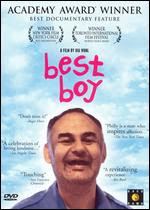
Sidenote: We are listening to Metal on Metal now while making soup. I highly recommend "Mothra" with all its role playing hanky panky innuendo. The latter part may be of my own insertion.
Sidenote 2: I was talking with a co-working who is deeply into Viking metal about Anvil. I told him the movie was great and that being a fan of metal he may really enjoy it. He said he listened to half of one song and almost punched a librarian because it was so bad. That said, you should listen to Anvil.
I'm going to write this without trying to sound sappy, but I find it difficult when writing about heavy metal. The five or so years I've been forcefully exposed to the genre by former boyfriends and through this I have gained enough respect and admiration (and doggone it, I think I might actually like some of it) for the musicians that I was really looking forward to watching Anvil: The Story of Anvil before it came out. Along with a healthy obsession with Spinal Tap, I was mentally prepared for an absurdly comedic tale of the rock band that kind of was, but then wasn't, but sort of is in Japan. In other words, I expected a group of struggling musicians trapped in their own fantasy worlds of Heavy Metal Parking Lot to be paraded around for the audience to laugh at, much in the vein of American Movie (review in progress). However, I found these folks, because honestly they are very folksy people, to be genuinely interesting and entertaining. Because, after all, they just want to entertain and play the music that they love and they're going through the hardships of middle age. The relation ship between Lips and Robb is especially touching. They argue of mismanagement and recording "shit takes" but in the end they sob on each others shoulders like junior high BFFs. Enough of the sweetness.

“Thumbs will twist. Can you resist? Thumb hang!”
With the heavy metal tropes of Satanism, moral disrepute, and the authoritative don’t give a shit, the guys of Anvil are angelically well tempered, driven by the passion in their hearts, and genuinely good people. This makes the fall of Anvil empire difficult to agree with and even harder to watch as Lips and the crew put forth all their efforts into the chance of making a comeback with a European tour. It’s almost sickening, really. One may wonder how such kind, devoted fellas could have been standing on the precipice of stardom in the mid 80s but are banished to hoi polloi day jobs as caterers for public schools and construction workers. Anvil becomes their alter ego and escape from reality. When expressing his lackadaisical opinion of his catering job, Lips confesses, “Anvil gives me happiness” and the drummer Robb Reiner comments of his construction job, “…I would rather be on stage. My other jackhammer is a drum set. ” Their families are more or less encouraging, Robb’s wife the most encouraging as the glam hair and tight black tank top leave their residue from 1985. Lips’s wife is surprising mom-like and normal in a bank teller sort of way. She gives no inclination to her husband’s dream of becoming a demi-god of Canadian metal.
On a brief side note, as a lover and student of art, Robb Reiner’s paintings featured briefly in the film are worth checking out. Sort of Edward Hopper meets De Chirico.
“I’d rather be a king below than a servant above, I’d rather free and hate than a prisoner of love; 666”

The fans are a crucial aspect of the film. In the beginning we are introduced to two “original Anvil fans” at a local bar; one man in a Flyers jersey and a salt n’ peppery bearded man who drinks a beer through his nose on stage. They recite lyrics in tandem with the band and liven the otherwise taciturn venue. The fervor of which these two approach Anvil is reserved for large metal festivals and the Japanese. Nearly one flop show after the next during their European tour and after disheartened return home the fan base doesn’t seem to be there, or anywhere. That is until they are invited to return to Japan. SPOILER ALERT. Of course the footage of Anvil playing to a Woodstockian crowd at a Tokyo festival in 1984 that had began the film is now juxtaposed next to their triumphal return to Japan as they are playing to a comparably large crowd some 20 years later at the end of the film while promoting their latest album "This is 13"; a name which pales in comparison to their previous albums "Metal on Metal", "Forged in Fire", "Strength of Steel", "Hot and Heavy", and "Backwaxed" which takes its title from a song about ejaculating on someone's back.
“It goes far beyond writing a good song It has nothing to do with the song it has to with a matter of attitude, what you’re willing to settle for, who you’re willing to work with, and having a good time with my life, with enjoying my life; That that’s the most expensive thing in life, and the most valuable things in life is your relationships, the people that you know, the places you’ve been, and the experiences that you’ve had.”
School Love






